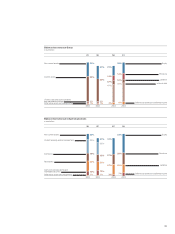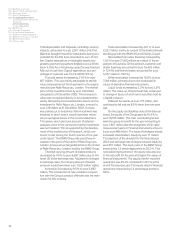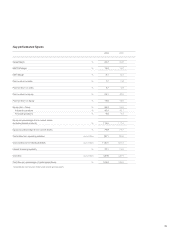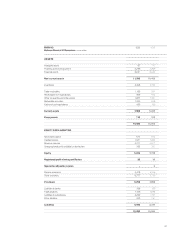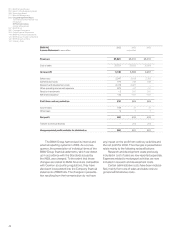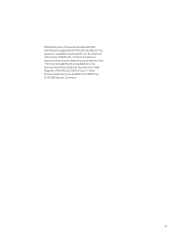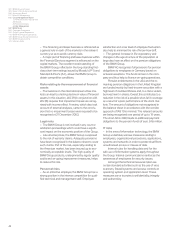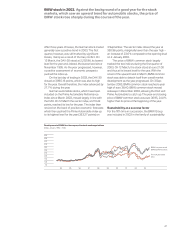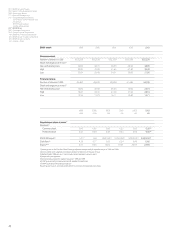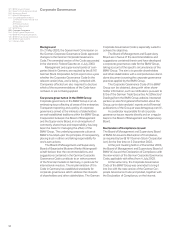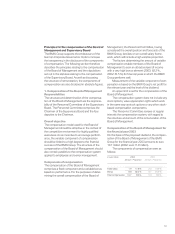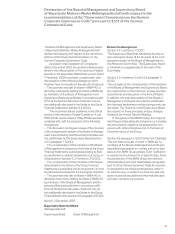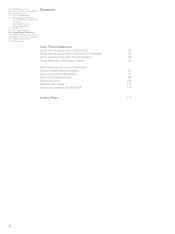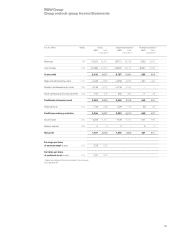BMW 2003 Annual Report Download - page 46
Download and view the complete annual report
Please find page 46 of the 2003 BMW annual report below. You can navigate through the pages in the report by either clicking on the pages listed below, or by using the keyword search tool below to find specific information within the annual report.45
–While not expected at the moment, an escalation
of political tensions or terrorist activities could have
a negative impact on the economic situation. This in
turn, could have a negative impact on the business
development of the BMW Group.
Specific industry risks
–In conjunction with the forthcoming enlargement
of the European Union, the scope of the EU End-of-
Life Vehicle Directive will also become relevant for
the new member states. The BMW Group has taken
account of its vehicles in the new member states
from an early stage and recognised provisions in the
balance sheet to cover all expected obligations re-
lating to vehicles sold to date. As a result of its activi-
ties in the area of vehicle recycling and the progress
made with “Design for Recycling”, the BMW Group
is well prepared to deal with end-of-life vehicles.
–The change in fuel prices, partly affected by the
market and partly by governmental tax policies, and
the requirement to reduce the fleet fuel consumption
and CO2emissions set high demands on engine and
product development.
Operating risks
–Risks arising from loss of production are insured
up to economically reasonable levels. In addition,
the high degree of flexibility of the BMW Group’s
production network and working time models also
helps to reduce risks of this kind.
–Close cooperation between manufacturers and
suppliers is normal in the automotive sector and
whilst this provides economic benefits, it also creates
a degree of mutual dependence. Some suppliers
have become very important for the BMW Group.
Delivery delays, cancellations or poor quality can lead
to production stoppages and thus have a negative
impact on profitability.
The BMW Group mitigates this risk by means
of extensive selection, monitoring and management
procedures in its dealings with suppliers. Before
selection, for example, the technical competence and
financial strength of potential suppliers are appraised.
A comprehensive Supplier Relationship Management
system also contributes to risk mitigation.
Risks related to the provision of financial
services
–
As a consequence of the growth of lease business,
the BMW Group faces an increased residual value
risk on the vehicles which are returned to the Group
at the end of lease contracts. Changes in the re-
sidual values of vehicles of the BMW Group on the
used car markets are therefore constantly monitored
and forecast. Provisions or other balance sheet
items are recognised to cover identified risks. This
risk is also reduced by measures such as active life-
cycle management and management of used car
markets at an international level, both of which have
a stabilising effect on residual values.
–Against the background of Basel II requirements,
the BMW Group is committed to the use of scoring
systems and rating methods to avoid bad debt risks
as far as possible. The appropriate processes and
IT infrastructure are continually being developed.
Management tools, including ones based on a value-
at-risk approach, are used to minimise and control
potential losses.
– Operating risks relating to the provision of finan-
cial services are managed by the BMW Group by
means of a process which records and measures
risks and incorporates specific measures to avoid
risk. In this way, the BMW Group minimises the risk
of losses, which could arise as a result of the in-
appropriateness or failure of internal procedures and
systems, human error or external factors.
– Liquidity and interest rate change risks to which
the BMW Group is exposed are mitigated by match-
ing maturities and by the use of derivative financial
instruments. Interest rate change risks are managed
using a value-at-risk approach. In addition, sensi-
tivity analyses are prepared on an on-going basis to
measure the potential impact of interest rate changes
on earnings.


